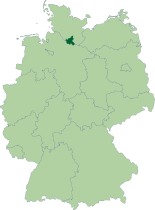Free and Hanseatic City of Hamburg
|
Free and Hanseatic City of Hamburg Freie und Hansestadt Hamburg |
|||
|---|---|---|---|
| State of Germany | |||

1st row: View of the Binnenalster; 2nd row: Elbphilharmonie, Speicherstadt, River Elbe; 3rd row: Alsterfleet; 4th row: Port of Hamburg, Dockland office building
|
|||
|
|||
 |
|||
| Coordinates: 53°33′55″N 10°00′05″E / 53.56528°N 10.00139°ECoordinates: 53°33′55″N 10°00′05″E / 53.56528°N 10.00139°E | |||
| Country | Germany | ||
| Government | |||
| • First Mayor | Olaf Scholz (SPD) | ||
| • Governing parties | SPD / The Greens | ||
| • Bundesrat votes | 3 (of 69) | ||
| Area | |||
| • City | 755 km2 (292 sq mi) | ||
| Population (31 December 2015) | |||
| • City | 1,787,408 | ||
| • Density | 2,400/km2 (6,100/sq mi) | ||
| • Metro | 5,046,182 | ||
| Demonym(s) | Hamburger | ||
| Time zone | CET (UTC+1) | ||
| • Summer (DST) | CEST (UTC+2) | ||
| Postal code(s) | 20001–21149, 22001–22769 | ||
| Area code(s) | 040 | ||
| ISO 3166 code | DE-HH | ||
| Vehicle registration |
|
||
| GDP/ Nominal | €109/$121 billion (2015) | ||
| GDP per capita | €62,000/$68,000 (2015) | ||
| NUTS Region | DE6 | ||
| Website | hamburg.de | ||
| 10 Largest Migrant Communities | |
| Nationality | Population (2015) |
|---|---|
|
|
92,745 |
|
|
74,234 |
|
|
35,805 |
|
|
32,388 |
|
|
20,429 |
|
|
20,419 |
|
|
12,239 |
|
|
11,956 |
|
|
11,652 |
|
|
10,942 |
Hamburg (/ˈhæmbɜːrɡ/; German pronunciation: [ˈhambʊɐk], local pronunciation [ˈhambʊɪ̯ç]; Low German/Low Saxon: Hamborg - [ˈhambɔːç]), officially Freie und Hansestadt Hamburg (Free and Hanseatic City of Hamburg), is the second largest city in Germany and the eighth largest city in the European Union. It is the second smallest German state by area. Its population is over 1.7 million people, and the wider Hamburg Metropolitan Region covers more than 5.1 million inhabitants. The city is situated on the river Elbe.
The official long name reflects its history as a member of the medieval Hanseatic League, as a free imperial city of the Holy Roman Empire, a city-state, and one of the 16 states of Germany. Before the 1871 Unification of Germany, it was a fully sovereign state. Prior to the constitutional changes in 1919, the civic republic was ruled by a class of hereditary grand burghers or Hanseaten. Though repeatedly destroyed by great fires, floods and military conflicts including WW2 bombing raids, the city managed to recover and emerge wealthier after each catastrophe.
...
Wikipedia


